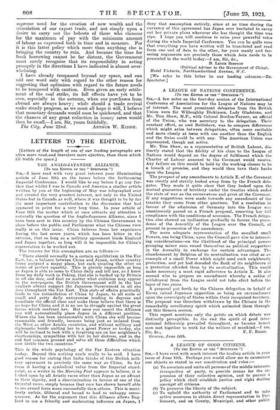A LEAGUE OF NATIONS CONFERENCE. [To THE EDITOR OF THE
" SPECTATOR."' SIR,—A few notes on the four-day session of the International Conference of Associations for the League of Nations may be of interest. The most prominent delegates from the British Union were Sir Willoughby Dickinson, Lady Gladstone, and Mr. Tom Shaw, M.P., with Colonel Borden-Turner, an official of the Union, who was secretary to the delegation. Their constant effort, as cool Britishers, was to compose differences which might arise between delegations, often more excitable and more closely at issue with one another than the English and the Swiss could be with any. The American Union was represented, though not active.
Mr. Tom Shaw, as a representative of British Labour, dis- tinctly stated that the fidelity of his class to the League of Nations would depend on the degree of fulfilment which the Charter of Labour annexed to the Covenant would receive. Any failure on this would be held by the working classes to be a breach of promise, and they would then turn their backs upon the League.
The prospect of any amendments to Article X. of the Covenant was stoutly and sternly looked away from by the French dele- gates. They made it quite clear that they looked upon the mutual guarantee of territory under the treaties which ended the state of war as the corner-stone and pivot of the Covenant. If any suggestions were made towards any amendment of the treaties they came from other quarters. Yet a resolution in favour of the admission of Germany into the League was unanimously passed on a French proposal, reserving her full compliance with the conditions of accession. The French delega- tion also showed an inclination gradually to favour the prece- dence of the Assembly of the League over the Council, at present in possession of the ascendancy.
The more adequate representation of the so-called small Powers, one being China, upon the Council gave rise to interest- ing considerations—on the likelihood of the principal powers grouping minor ones round themselves as political supporters in the Assembly in exchange for certain advantages. The abandonment by Belgium of its neutralization was cited as an example of a small Power which might need such neighbourly protection, and yet had denuded the flank of its neighbours of a protection afforded them by its neutralization. This would make necessary a most rigid adherence to Article X. It also seemed wise to propose an amendment whereby a notice of withdrawal from the League could not take effect before the lapse of two years.
A proposal put forth by the Chinese delegation in behalf of Korea raised Japanese opposition as being an encroachment upon the sovereignty of States within their recognized territory. The proposal was therefore withdrawn by the Chinese in the remarkably conciliatory spirit which animated them through- out this Geneva session.
This report mentions only the points on which debate was distinctly perceptible. In the end the spirit of good inter- national fellowship prevailed throughout, as became honest men met together to work for the welfare of mankind.—I am,


































 Previous page
Previous page